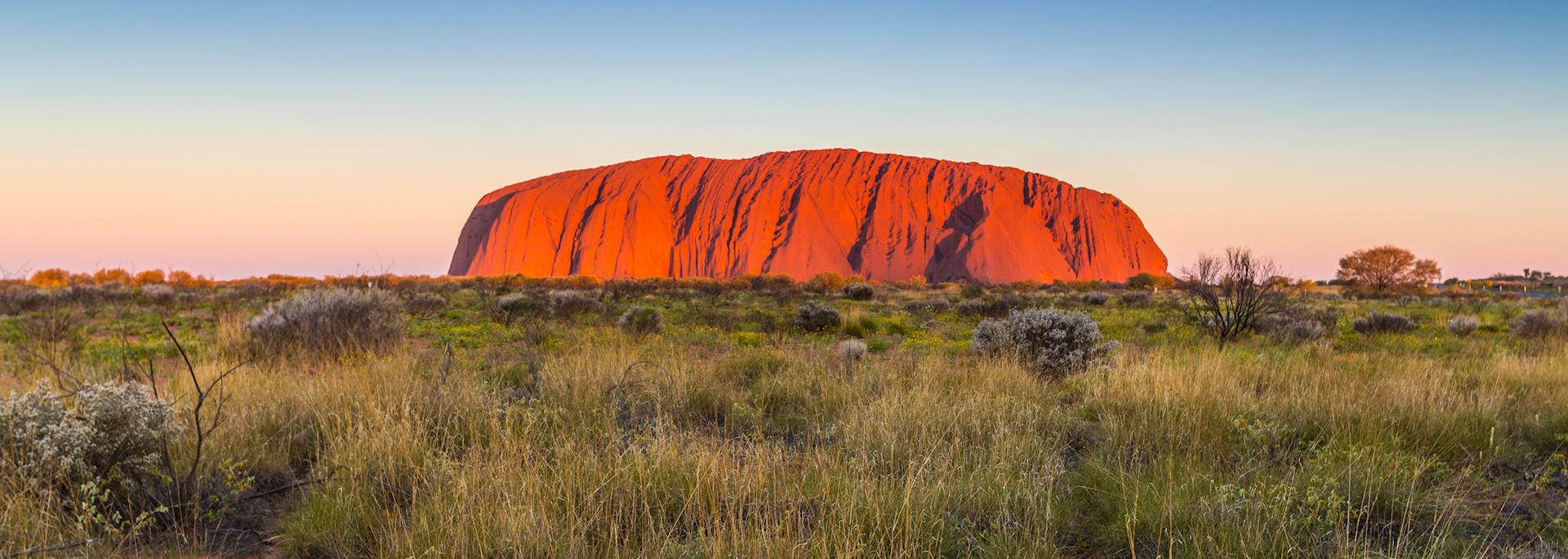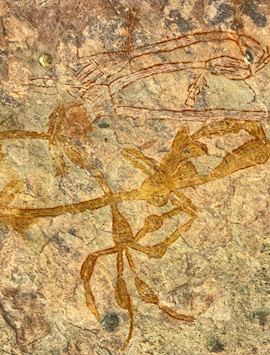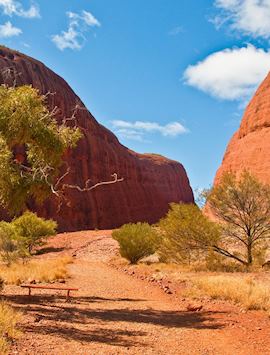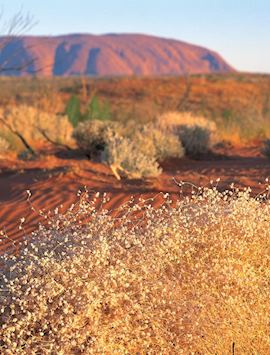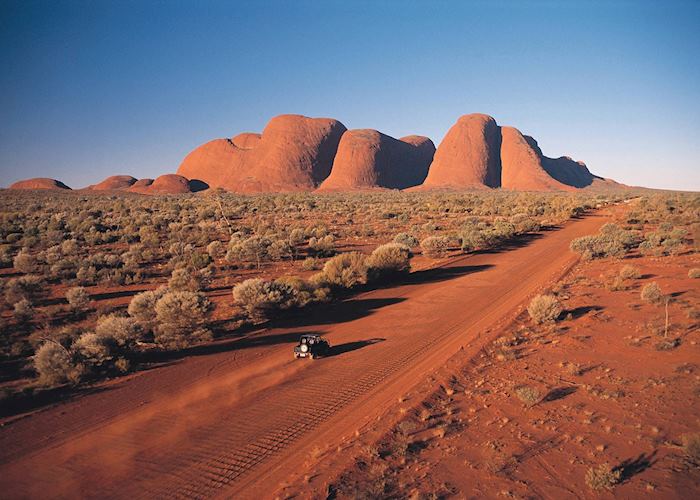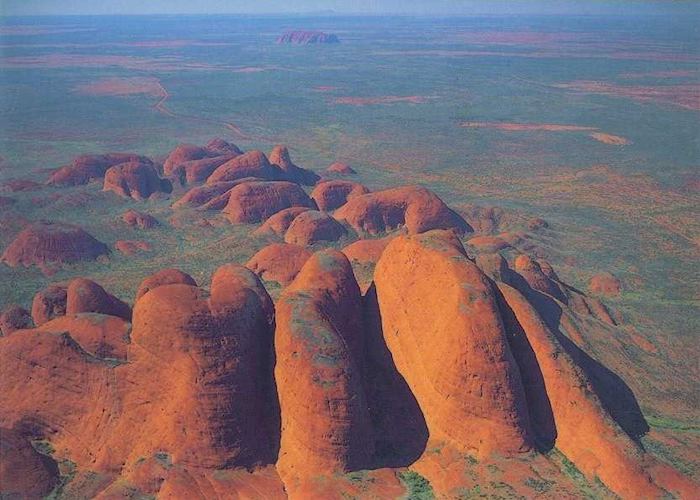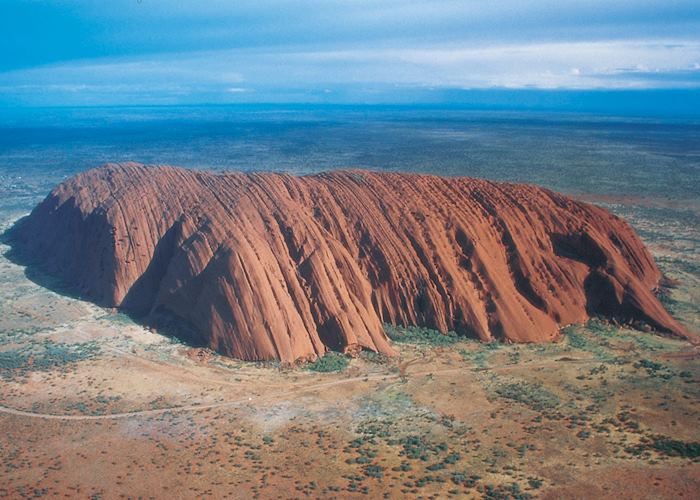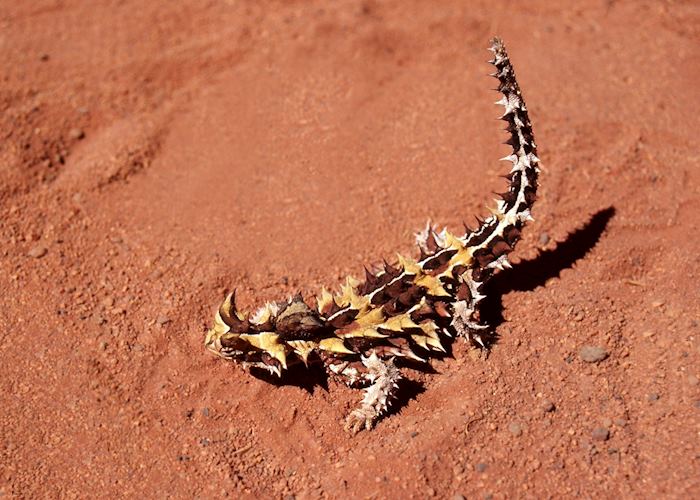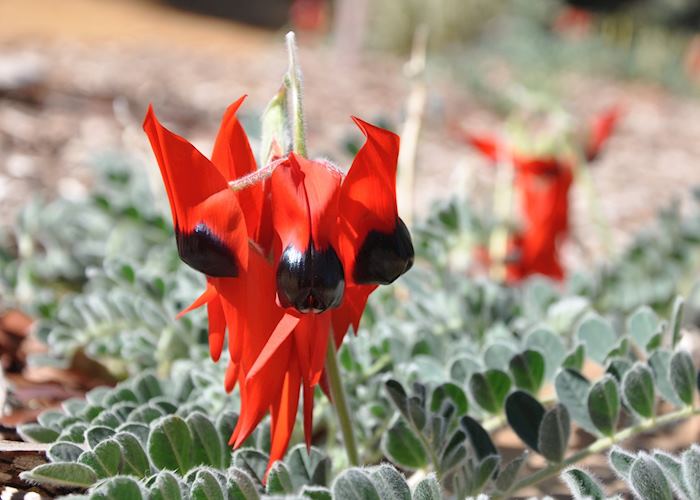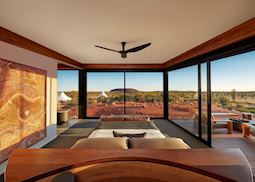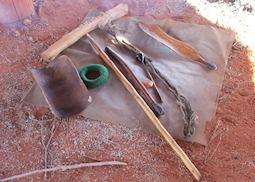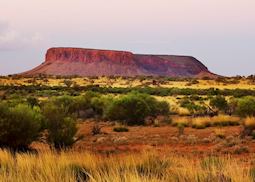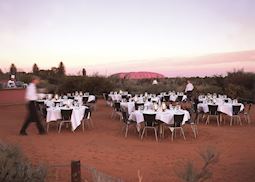Jump to:
Cradle of aboriginal culture, land of Australian icons, Outback desert, and a large-scale art installation in the heart of Australia’s remote Red Centre.
Visitors flock to Australia’s best-known tranche of Outback for two main reasons: the giant sandstone monolith of Uluru (once known as Ayers Rock) and the 36 conglomerate domes of Kata Tjuta (formerly called the Olgas). These one-of-a-kind geological phenomena rise from the surrounding bronzed, pancake-flat desert plains with a wholly unexpected beauty.
Touring the formations allows you to admire their changing shades and shapes at varying times of day. Our guides will help elucidate how both Uluru and Kata Tjuta are central to the local Anangu people’s Dreaming beliefs, and during your time here, you’ll have lots of opportunities to develop a deeper understanding and appreciation for their culture.
Things to see and do in Uluru-Kata Tjuta National Park
Anangu culture & art
The Cultural Centre, which you can visit independently, is a good starting point for exploring the park. It’s filled with interactive, cleverly thought-out exhibits about Anangu culture as well as desert flora and fauna. There are also two aboriginal art galleries in the Centre, plus you’ll find contemporary Indigenous art on display at the Gallery of Central Australia, which has several artists in residence.
Uluru base walk
 A guided walk circumnavigating the base of Uluru gives you a sense of the monolith’s sheer size, but also the variety of habitats this seemingly barren desert landscape contains. You’ll hike around 10 km (6 miles) of track, passing through unshaded and exposed sections, native grasses, acacia trees, and permanent waterholes. Along the way, you’ll view caves filled with rock art, and see how the entire rock base is laced with sites that are deeply sacred to, and reserved for, the Anangu.
A guided walk circumnavigating the base of Uluru gives you a sense of the monolith’s sheer size, but also the variety of habitats this seemingly barren desert landscape contains. You’ll hike around 10 km (6 miles) of track, passing through unshaded and exposed sections, native grasses, acacia trees, and permanent waterholes. Along the way, you’ll view caves filled with rock art, and see how the entire rock base is laced with sites that are deeply sacred to, and reserved for, the Anangu.
Sunset over Uluru
Watching the day draw to a close over Uluru, where flamboyant shades of orange and red light up its great flanks in changing patterns, is often a highlight of your time here. You can visit a sunset viewing platform, or alternatively, begin a guided base walk of Uluru in the late afternoon, finishing in time to watch the sun go down.
Exploring Kata Tjuta
 Some 30 km (19 miles) from Uluru is Kata Tjuta (meaning ‘many heads’), its cluster of domes creating a system of gorges and wind-whipped valleys. You can head out early to explore the domes at sunrise, where a guide will explain how Kata Tjuta was and still is a sacred men’s ceremonial site for the Anangu. With your guide, you’ll walk the Valley of the Winds trail, wandering through the Olga Gorge that leads to an immense cliff face and quiet rock pool.
Some 30 km (19 miles) from Uluru is Kata Tjuta (meaning ‘many heads’), its cluster of domes creating a system of gorges and wind-whipped valleys. You can head out early to explore the domes at sunrise, where a guide will explain how Kata Tjuta was and still is a sacred men’s ceremonial site for the Anangu. With your guide, you’ll walk the Valley of the Winds trail, wandering through the Olga Gorge that leads to an immense cliff face and quiet rock pool.
Tali Wiru, or the ‘Sounds of Silence’ dinner
Meaning ‘beautiful dune’ in the Anangu language, Tali Wiru is an alfresco dining experience that sees you transported to a quiet dune with a view of Uluru on the horizon. As the light fades and a local didgeridoo player performs, you’ll dine on a gourmet bushtucker barbecue (including kangaroo and emu) alongside fine Australian wines. After dark, you’ll stargaze with the help of an astronomer, and listen to an Anangu storyteller speak of the Dreaming.
Field of lights (Tili Wiru Tjuta Nyakutjaku)
Best viewed at sunset or sunrise, this large-scale art installation was created by Bruce Munro and originally intended to be a temporary exhibition. Situated on a desert plain within sight of Uluru, it stretches over an area that’s about the size of a major sports stadium, amid red-sand dunes and spinifex.
Conceived as a ‘fantasy garden,’ it contains 50,000 slender glass spheres on spindly stalks that illuminate in waves of light, rippling through shades of ochre, deep violet, blue, and white. The installation’s name in the local Pitjantjatjara language means simply, ‘looking at lots of beautiful lights,’ but that might be a polite understatement: this is an immersive sensory experience that’s elevated and made more striking by its setting.
Best time to visit Uluru Kata-Tjuta National Park
You can visit the park at almost any time of year, but May to September brings cooler temperatures of 68-86 °F (20-30 °C), which makes for more comfortable conditions if you’re heading out on desert walks.
who's been there

Start planning your tailor-made trip to Uluru-Kata Tjuta National Park by contacting one of our Australia specialists
-
617-223-4521617-223-4575
- Make an inquiry
Suggested itineraries featuring Uluru-Kata Tjuta National Park
Our itineraries will give you suggestions for what is possible when you travel in Uluru-Kata Tjuta National Park, and they showcase routes we know work particularly well. Treat them as inspiration, because your trip will be created uniquely by one of our specialists.
Places near Uluru-Kata Tjuta National Park
- Kings Canyon & Watarrka National Park 83 miles away
- The MacDonnell Ranges 149 miles away
- Alice Springs 212 miles away
Photos of Uluru-Kata Tjuta National Park
Our expert guides to exploring Uluru-Kata Tjuta National Park
Written by our specialists from their own experiences of visiting Uluru-Kata Tjuta National Park, these guides will help you make the most of your time there. We share both our practical recommendations and the best ways to appreciate Uluru-Kata Tjuta National Park at its best.
-
What to do in Australia: our highlights guide ![Sydney Harbour Bridge]()
What to do in Australia: our highlights guide
What to do in Australia: our highlights guide
A country the size of Australia provides a vast and varied array of experiences. Country specialist, Amy, narrows down some of the key highlights for first-time visitors to the country, as well as a couple of lesser-explored options for your Australia vacation.
Read this guide
Accommodation choices for Uluru-Kata Tjuta National Park
We've selected a range of accommodation options for when you visit Uluru-Kata Tjuta National Park. Our choices usually come recommended for their character, facilities and service or location. Our specialists always aim to suggest properties that match your preferences.
-
![Sails in the Desert, Uluru/Ayers Rock]()
Sails in the Desert
Uluru-Kata Tjuta National Park -
![Longitude 131]()
Longitude 131°
Uluru-Kata Tjuta National Park -
![Desert Gardens Pool]()
Desert Gardens Hotel
Uluru-Kata Tjuta National Park
Ideas for experiencing Uluru-Kata Tjuta National Park
Our specialists seek out authentic ways to get to know the places that could feature in your trip. These activities reflect some of the experiences they've most enjoyed while visiting Uluru-Kata Tjuta National Park, and which use the best local guides.
-
Full Day Cave Hill Tour ![Traditional Aboriginal tools, Anangu Tours]()
Full Day Cave Hill Tour
Full Day Cave Hill Tour
This full day tour is an indigenous cultural experience that provides a fascinating insight into everyday Aboriginal life. You will journey by 4x4 and travel deep into the desert of the Pitjantjatjara Lands of Central Australia.
View details -
Mount Conner Outback Safari with SEIT Safaris ![Mt Conner tour with SEIT]()
Mount Conner Outback Safari with SEIT Safaris
Mount Conner Outback Safari with SEIT Safaris
Follow 4x4 tracks and a landscape which betrays a fascinating geological past on this full day tour of Mount Conner.
View details -
Sounds of Silence Dinner ![Sounds of Silence dinner, Uluru]()
Sounds of Silence Dinner
Sounds of Silence Dinner
In front of you is the fabled Uluru; behind you are the domes of Kata Tjuta and, possibly the most spectacular sunset you have ever seen. Here you enjoy sparkling wine and a selection of delectable canapés whilst a local didgeridoo player explains and performs this traditional aboriginal instrument.
View details
